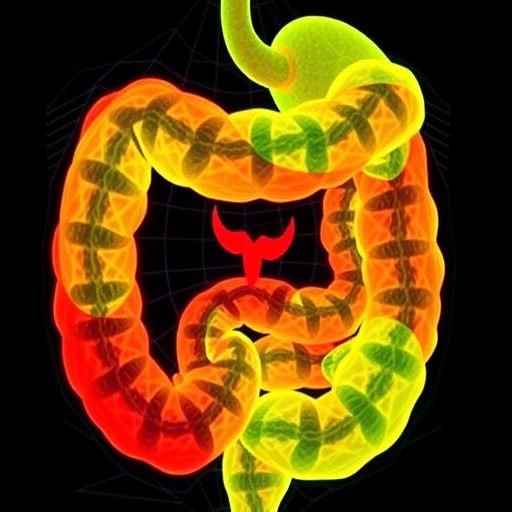
In a groundbreaking new study, researchers are pushing the boundaries of what artificial intelligence can achieve in the realm of healthcare, specifically in gastroenterology. This innovative research has revealed that AI-driven computer vision technologies are not only matching the skills of seasoned gastroenterologists but may also surpass traditional assessment methods when evaluating endoscopic imagery for Crohn’s disease patients. The implications of these findings could potentially reshape the future of diagnostics and treatment protocols in inflammatory bowel diseases.
The study, published in the esteemed journal Clinical Gastroenterology and Hepatology, focuses on the capability of AI to identify mucosal ulceration with a level of precision comparable to that of human experts. Existing endoscopic scoring systems, used primarily for assessing Crohn’s disease severity, have long faced criticism for their inconsistencies and subjectivity. However, AI offers a robust alternative that could enhance diagnostic accuracy, providing a clearer lens through which to understand this complex and often debilitating condition.
Within this study, two experienced gastroenterologists meticulously annotated ulcer areas in a staggering dataset of 4,487 still images derived from prior endoscopic videos of Crohn’s disease patients. This rigorous process highlights the critical nature of expert input in training AI models to ensure the accuracy of image classification. By comparing the performance of these AI algorithms with annotations made by gastroenterologists, researchers aimed to ascertain the efficacy of AI in creating more reliable and objective metrics for endoscopic evaluations.
The results were nothing short of remarkable. The AI model showed a DICE similarity score of 0.591, reflecting a higher level of agreement with annotated images than the inter-doctor agreement, which scored only 0.462. This numerical representation emphasizes the strength of AI as a tool in medical diagnostics, particularly when conventional methods may fall short. Furthermore, assessments made by the AI model were found to have a strong correlation with the widely recognized Simple Endoscopic Score for Crohn’s Disease (SES-CD), a metric developed to quantify ulcerative damage. This connection underscores the potential for AI to not just measure, but enhance current scoring frameworks, providing invaluable insights into disease progression and response to treatment.
The researchers involved in this study do not merely stop at technological achievements. They acknowledge the pressing need for more robust, standardized measures in Crohn’s disease research, particularly as treatment landscapes evolve. Physicians often rely on their clinical experience, which can lead to variances in diagnosis due to the subjective nature of interpreting endoscopic findings. As Dr. Ryan W. Stidham from the University of Michigan Medical School articulates, while clinicians possess an intuitive understanding of disease severity, the existing tools to capture that nuance remain inadequate. The advent of AI image analysis could bridge this gap, providing a more objective foundation for evaluating patient health.
AI’s implementation in assessing endoscopic visuals has the potential to revolutionize treatment strategies, especially in regions where access to specialized inflammatory bowel disease (IBD) experts is limited. In healthcare settings lacking IBD specialists, AI-driven interpretations may serve as a guiding framework for treatment decisions, ensuring patients receive appropriate care even in challenging environments. Moreover, experienced gastroenterologists could leverage these advanced metrics to refine their diagnostic processes, ultimately leading to better patient outcomes.
The broader impacts of this research extend beyond patient care. The integration of AI in routine endoscopic assessments could fundamentally alter the landscape of medical education and drug development. By providing a more precise framework for understanding Crohn’s disease pathology, researchers could facilitate the development of targeted therapies that align more closely with individual patient needs. Such advancements could drive significant progress in treating this complex illness, reducing the burden on patients and healthcare systems alike.
As the researchers emphasize, this study constitutes merely the initial step in a much larger movement to rethink and refine how IBD is quantified in clinical settings. While it may be early days for AI integration in gastroenterology, the promise it holds is clear. As AI technologies evolve alongside traditional medical practices, the goal remains to ensure that both can coexist, leveraging the unique strengths of each to enhance patient care.
In essence, this study not only highlights the potential of AI in transforming the assessment of Crohn’s disease but also opens the door to a future where machine learning tools play an integral role in the holistic treatment of patients. The effective collaboration between AI systems and medical professionals could usher in a new era of healthcare, one where decisions are grounded in more empirical data and less prone to human error. As researchers continue to explore these synergies, the future holds vast promise for innovation in the field of gastroenterology.
Overall, as AI technologies become increasingly sophisticated and integrated into medical frameworks, it is vital to continue exploring their application in clinical environments. Whether it is through enhancing diagnostic accuracy or optimizing treatment plans, the study marks an important milestone that challenges outdated paradigms in healthcare. AI-powered assessments could lead to more personalized care approaches, ultimately improving the quality of life for millions of individuals affected by Crohn’s disease and other inflammatory bowel disorders.
In summary, this research stands as a testament to the potential of artificial intelligence within the medical sphere, showcasing how technology can transcend traditional limitations and unlock new pathways to understanding and managing chronic diseases. As ongoing developments continue to emerge, the intersection of AI and medicine will likely precipitate profound changes in how healthcare is delivered, paving the way for more informed, efficient, and empathetic practices.
Subject of Research: People
Article Title: Artificial Intelligence for Quantifying Endoscopic Mucosal Ulceration in Crohn’s Disease
News Publication Date: 18-Aug-2025
Web References: https://www.cghjournal.org/article/S1542-3565(25)00655-X/fulltext
References: http://dx.doi.org/10.1016/j.cgh.2025.05.026
Image Credits: N/A
Keywords
Tags: advancements in medical imagingAI in gastroenterologyAI-enhanced colonoscopycomputer vision in healthcareCrohn’s disease diagnosticsdiagnostic accuracy in Crohn’s diseaseendoscopic imagery analysisendoscopic scoring systemsexpert annotation for AI trainingfuture of AI in healthcareinflammatory bowel disease researchprecision medicine in gastroenterology





